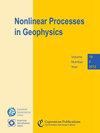Ensemble Kalman filter in geoscience meets model predictive control
IF 2.4
4区 地球科学
Q3 GEOSCIENCES, MULTIDISCIPLINARY
引用次数: 0
Abstract
Abstract. Although data assimilation originates from control theory, the relationship between modern data assimilation methods in geoscience and model predictive control has not been extensively explored. In the present paper, I discuss that the modern data assimilation methods in geoscience and model predictive control essentially minimize the similar quadratic cost functions. Inspired by this similarity, I propose a new ensemble Kalman filter (EnKF)-based method for controlling spatio-temporally chaotic systems, which can readily be applied to high-dimensional and nonlinear Earth systems. In this method, the reference vector, which serves as the control target, is assimilated into the state space as a pseudo-observation by ensemble Kalman smoother to obtain the appropriate perturbation to be added to a system. A proof-of-concept experiment using the Lorenz 63 model is presented. The system is constrained in one wing of the butterfly attractor without tipping to the other side by reasonably small control perturbations which are comparable with previous works.地球科学中的集合卡尔曼滤波器与模型预测控制相结合
摘要尽管数据同化源于控制理论,但现代地球科学中的数据同化方法与模型预测控制之间的关系尚未得到广泛探讨。在本文中,我讨论了现代地球科学中的数据同化方法和模型预测控制本质上都是最小化相似的二次成本函数。受这种相似性的启发,我提出了一种新的基于集合卡尔曼滤波器(EnKF)的时空混沌系统控制方法,该方法可轻松应用于高维和非线性地球系统。在该方法中,作为控制目标的参考向量通过集合卡尔曼平滑器作为伪观测被同化到状态空间中,从而获得要添加到系统中的适当扰动。本文介绍了使用 Lorenz 63 模型进行的概念验证实验。通过合理的微小控制扰动,系统被限制在蝴蝶吸引子的一侧,而不会向另一侧倾斜,这与之前的研究成果不相上下。
本文章由计算机程序翻译,如有差异,请以英文原文为准。
求助全文
约1分钟内获得全文
求助全文
来源期刊

Nonlinear Processes in Geophysics
地学-地球化学与地球物理
CiteScore
4.00
自引率
0.00%
发文量
21
审稿时长
6-12 weeks
期刊介绍:
Nonlinear Processes in Geophysics (NPG) is an international, inter-/trans-disciplinary, non-profit journal devoted to breaking the deadlocks often faced by standard approaches in Earth and space sciences. It therefore solicits disruptive and innovative concepts and methodologies, as well as original applications of these to address the ubiquitous complexity in geoscience systems, and in interacting social and biological systems. Such systems are nonlinear, with responses strongly non-proportional to perturbations, and show an associated extreme variability across scales.
 求助内容:
求助内容: 应助结果提醒方式:
应助结果提醒方式:


